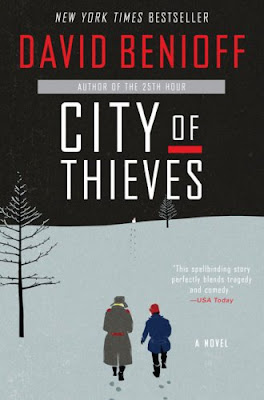City of Thieves
By David Benioff
Writing historical war fiction is a precarious endeavor. It's not a genre to be entered into lightly. To be sure, many writers have waded into the troubled waters of historical war fiction only to be overwhelmed by the demands of the material. It takes a particular sort to venture into the genre of historical war fiction. I find that once finished, you can usually organize their efforts in three distinct categories.
First, many writers tend to get bogged down in the violence, tragedy and gore of war. These novels tend to be very heavy-handed and the moral lessons via graphic violence are more than a little blunt. War, by its very nature, is brusque subject matter and it is tempting to bludgeon the reader with death and disfigurement but, as in actual war, readers desensitize and writers paint themselves into a gory corner from which they cannot hope to escape. While I am certainly not suggesting that writers censor violence in the hopes of a better novel, sometimes enough is enough.
Other writers err on the side of caution and tread far too lightly on the topic of war. What you get is war rendered of all its violence and chaos and emotion. These sorts of novels strip the subject matter of any real emotional or psychological meaning. Of course, the story trumps all, but war provides such an interesting backdrop, it deserves proper development. I often wonder why some writers choose to set their novels in a time of war if they aren't fully prepared to dish the full spectrum of the time. If you wanted to distance the narrative from the conflict, why incorporate it in the first place? But I digress.
The best writers of historical war fiction know how to walk the razor thin line between war's relentless tragedy and absurd comedy. War is humanity at its most extreme. There is no future or past for those caught in the tumult of a major conflict, only now and the hope of later. There is an immediacy to war that forces us to live entirely in the present, whether it is dealing with the dangers at hand or appreciating a small act of kindness. Writing war fiction is an un-ending balancing act between comedy and tragedy.
David Benioff, falls into the latter category. His best seller novel City of Thieves finds that balance with almost perfect symmetry. The novel oscillates so fluidly between the horrors of war and the small joys of the human experience. Like the best war novels, the conflict weaves through the narrative like a character unto itself, presenting itself when it needs to be presented and disappearing when it is time to disappear. Benioff personifies the war with a deft hand.
The story chronicles a week in the life of Lev Beniov, a teenage chess playing Jew born and raised in Leningrad who, upon the arrival of the Nazis in 1942, opts to stay in the city and ride out the siege. Lev is arrested for burglarizing a dead German paratrooper and imprisoned. His life is spared by a Russian army official who, along with a Red-Army-deserter-turned-aspiring-novelist Kolya, sends him out on a mission to find a dozen eggs for his daughter's wedding cake... by any means available. Arms with a letter from the official and a few hundred rubles.
If this doesn't sound absurd enough for you, Benioff's narrative takes any number of twists and turns once the unlikely duo set off on their impossible mission. What makes the story even better is that Benioff reveals much of what is to come in the first few pages of the book, though he leaves out the who, what, where, when, why and how. Having the outcome firmly in hand only accentuates the tone and tempo of this novel. The story veers so wildly from disparity to hilarity the reader can only assume much of this story is actually true.
This novel reminded me so much of Roberto Begnini's film Life is Beautiful. While not strictly the same, the way Benioff incorporates humor and absurdity into the story which is neither funny nor absurd. To be sure, the Second World War was a catastrophe in Europe, and perhaps doubly so in Russia, but it is all in the way it is presented. Benioff could have presented the Siege of Leningrad with the severity and seriousness of a historian, but what would it have accomplished? We'd all be a bit more knowledgeable about the war in Russia, but the human factor would have been denied.
It's a rare treat to find an author that can handle such sensitive subject matter with the care David Benioff displays. Few authors have the ability to simultaneously depict the gravity and absurdity of war the way Benioff does here. Highly, highly recommended.

5 comments:
This sounds really good.
The siege of Leningrad was a particularly horrible business as was much that went on at the Eastern Front in WWII. A few years ago I read "The 900 Days: The Siege Of Leningrad" by Harrison Salisbury. I highly recommend this. It is a bit disturbing but a riveting history.
I've heard about this book and it sounds something that will be right up my alley. I'm glad you liked it and wrote this wonderful post.
http://www.ManOfLaBook.com
I loved your analysis of the three kinds of war fiction/nonfiction writers. It's something I struggle with as well - I end up feeling manipulated by the author. I've heard a lot about this book, but never got to read it yet. I'll be checking it out soon.
Aaaaand now I have another title on the endless list of books I want to read. Thanks, Ryan. ;)
Jonathan
www.ireadabookonce.com
I loved this book. I was surprised how there was so much humor in a depressing war novel.
Post a Comment